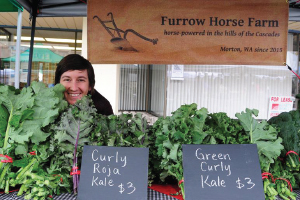Student debt a barrier for beginning farmers
by Ariana Taylor-Stanley
This article was originally published in August 2015

The Young Farmer Success Act seeks to address a major crisis facing American agriculture: Not enough young people are becoming farmers. As the majority of existing farmers near retirement, we’ll need at least 100,000 new farmers to take their place. Between 2007 and 2012, the number of young farmers increased by only 1,220.
Ten years into her career as an organic farmer, Caitlin Arnold’s student debt is growing. After graduating from Seattle University in 2005, Arnold took a farming job on a whim and discovered a passion for it. “I have kept farming all these years,” she reflected, “because out of all the things I’ve tried to do for work, it’s the only thing that gives me total satisfaction and makes me happy.”
Agricultural work, however, hasn’t paid enough for Arnold to keep up with her student loan payments, resulting in thousands of dollars of additional interest.
Arnold isn’t alone. A 2014 National Young Farmers Coalition (NYFC) survey of 700 young farmers with student loan debt found the average burden of student loans was $35,000 and that 53 percent of respondents currently are farming but have a hard time making their student loan payments. Another 30 percent are interested in farming but haven’t pursued it as a career because their salary as a farmer wouldn’t be enough to cover their student loan payments.
While student farms are sprouting up to teach farm skills on college campuses across the country, debt poses a major barrier to starting a farm business.
Arnold has watched friends without student debt make down payments on farmland of their own, while she and her partner, Brandon Wickes, who also has student debt, rent the land they cultivate, which limits the number of years into the future they can plan. “Right now, I’m not letting it [debt] stop me from farming but it hangs over my head all the time. I know it’s going to affect us down the road.”
At a time when the number of farmers in the United States is shrinking and their average age is climbing, many organizations are looking for ways to reduce barriers to getting into agriculture.
Loan forgiveness?
The Young Farmer Success Act (House Bill 2590) was introduced in Congress in June and would incentivize farming as a career by adding farmers to the Public Service Loan Forgiveness Program. This forgiveness program is currently open to anyone working for a government, nonprofit, public health, education, or safety organization, and forgives payment on student loans of public servants after 10 years in the field. Adding farming to the list would mean that serious, full-time farmers also would see their loans disappear after 10 years.
“Our farmers not only generate vital economic activity in every state, they produce our food and fiber and protect the rural landscape as true public servants,” said Representative Chris Gibson (R-NY), who introduced the bill along with Representative Joe Courtney (D-CT). “This common-sense legislation makes it far easier for our college graduates to return to the family farm or begin production on land of their own, safeguarding a way of life that sustains our nation.”
Campaign to help
The NYFC has launched a campaign addressing farmer student debt and is gathering support for the Young Farmer Success Act.
The loan forgiveness program, and student debt in general, “is not something people think about as a farm issue,” Eric Hansen, NYFC policy analyst, explains. However, Arnold says, farmers “provide people with the means to stay alive. It’s just as much of a public service as being a doctor or a teacher.” NYFC is raising public awareness via a social media campaign using the hashtag #FarmingIsPublicService.
Sign up for updates on the #FarmingIsPublicService campaign at www.youngfarmers.org/studentloans. Learn about Caitlin Arnold’s farm, Furrow Horse Farm, at furrowhorsefarm.com.
Ariana Taylor-Stanley farms (student-debt-free) with City Grown Seattle.
